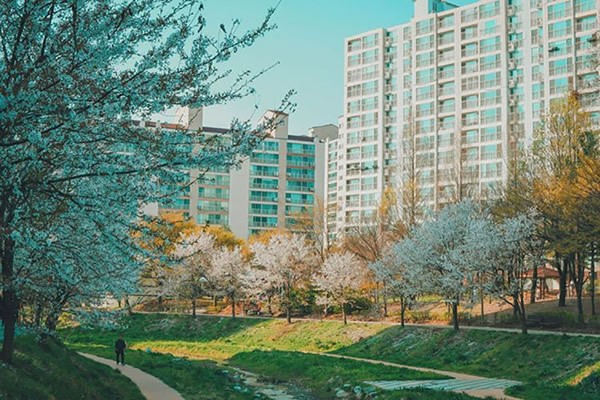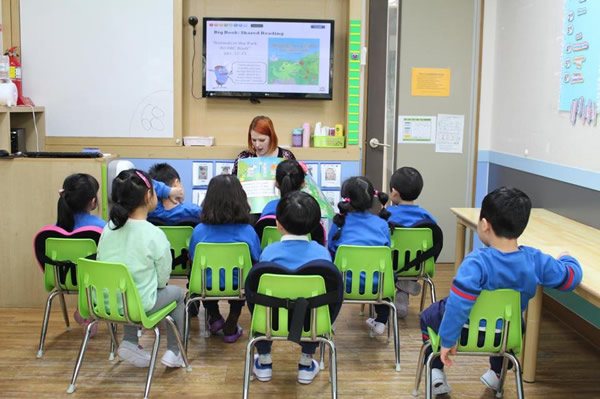ESL in East Asia’s Land of the Morning Calm
A Guide to Teaching English and Living in South Korea
By Linda Dunsmore, Linda Goes East
Published 3/4/2019
 |
The author in a traditional South Korean dress called a hanbok.
Photo credit Linda Dunsmore from Linda Goes East. |
When it comes to teaching English in East Asia, China and Japan are usually the first destinations ESL teachers look at. After all, China currently has the largest ESL job market with vacant positions in virtually every corner of the vast nation. Japan, too, has been a golden start on the ESL horizon for decades but the rising cost of living makes it harder to maintain a comfortable lifestyle as a teacher there. When looking at the East Asia region, many teachers overlook another, very promising, contestant: South Korea. English education is taken incredibly serious by Korean parents, and the market is booming. Experienced as well as new teachers can find very lucrative positions with high salaries and attractive benefit packages in South Korea. The vibrant culture and comparably low cost of living make for the ideal experience teaching English abroad.
Teaching English in South Korea
Seoul is the country’s capital and a major business hub in the Asia region. With more than 10 million people, Seoul also has a lot to offer and is the perfect mix of old and new. Ancient temples, palaces, and city walls stand next to the 5th tallest building in the world and futuristic buildings design by Zaha Hadid. With English language institutes on every corner, Seoul is a true paradise for job seekers in the English education field. However, besides Seoul, there are many other places to find work as an English teacher in South Korea.
 |
Cherry blossoms bloom all over the country.
Photo credit Linda Dunsmore from Linda Goes East. |
A popular gateway to your South Korean adventure is the established EPIK program. The English Program is a scheme run by the South Korean government and places foreign teachers into schools across the country to work as English language instructors. This program is one of the largest teaching programs of its kind and extremely popular among new and experienced teachers alike. EPIK offers a competitive salary, a good range of extra benefits, and the chance to experience living and working in a unique cultural environment.
A TEFL or TESOL certificate is not an official requirement to obtain a work visa to teach in South Korea (yet), but due to the extremely competitive ESL job market, most employers prefer candidates who are TEFL qualified. ITTT offers TEFL certification courses accepted in South Korea.
When teaching English in South Korea, you can choose between an urban metropolis, a rural paradise, or a mix of both! Wherever you end up teaching, you will have the experience of a lifetime!
Types of Teaching Jobs in South Korea
There are different types of schools that hire English language teachers in South Korea, and each type has its advantages and disadvantages. When choosing the right school, it all comes down to the individual teacher, their experiences, and personal preferences. Most commonly, an English teacher in South Korea works either at a public school or at a private English language institute.
 |
Teaching English to a kindergarten class.
Photo credit Linda Dunsmore from Linda Goes East. |
- Private English Language Schools: Private school teachers tend to start work a little later in the day, often around 1 pm, and then finish at 9 pm with a dinner break in between. The salary for private school teachers is a little higher. On average, an English teacher in South Korea earns between 1.8 and 3 million Korean Won per month (currently $1,600 to $2,675). Teachers working in big cities also earn a little more due to the slightly higher cost of living in the cities.
- Public Schools: Public school teachers usually earn a little less than private school teachers but tend to have a couple more paid holidays per year and usually work from 9 to 5.
- Test-prep classes are also very common and mostly taught at private institutes but public schools in Korea also have special test-prep classes. The most common English test in South Korea is the TOEIC test but IELTS a TOEFL are also often taken.
- Private and public universities offer the chance to teach bright young adults. Experienced teachers, and often those with a Master’s degree in English, Education or similar, also find work at Korean universities.
- International schools often pay the highest salaries but also have the toughest requirements. If you have a teaching license from your home country and several years of experience, you can also find a job with an international school.
Living in South Korea
Teacher salaries in South Korea are very competitive, meaning that teachers usually earn enough to enjoy a comfortable lifestyle and are able to save a substantial amount of their salary. The cost of living in South Korea is lower than in Japan, for instance, but higher compared to China.
English teachers in South Korea earn between 1.8 and 3 million Korean Won per month (currently $1,600 to $2,675). Universities and international schools, however, often pay more than that and teachers there can earn up to 3.5 million KRW ($3,120 USD). First-time teachers make a salary of 1.8 to 2.0 million KRW per month, which equates to around $1,600 to $1,780 US dollars.
When it comes to teaching English in South Korea, the biggest advantage compared to other destinations are the many benefits teachers receive. This includes paid housing and airfare and an end-of-contract bonus. Most teachers working in South Korea are also eligible for the national pension scheme and can receive this money upon leaving South Korea at the end of their teaching contract as well. Healthcare in South Korea is also very affordable and automatically deducted from your monthly salary. A meal at a local restaurant usually costs between $5 and $7 USD, and a cup of coffee will cost you around $2.
South Korea’s public transportation system is also incredibly modern, and most big cities have a subway system. Getting from point A to point B is very fast and convenient in the city. If you’d like to go on an adventure out of the city, the countless express buses and KTX bullet trains will get you there in no time. That being said, it’s well worth exploring all that South Korea has to offer while you’re there as there is a lot to see. With 22 national parks and the ocean never far away, nature and hiking enthusiasts will have the time of their life. On top of that, South Korea has many ancient temples, old palaces and other cultural heritage that’s unique to any other country in the world.
 |
A lantern parade in Seoul.
Photo credit Linda Dunsmore from Linda Goes East. |
South Korea hosts a large expat population in virtually every city. Many of the expats living in South Korea are English teachers, but that’s not all people do. Foreign exchange students and professionals from all over the world are coming to live and work in South Korea. All this has brought about a wide variety of cultural and non-cultural activities to engage in all across South Korea. There’s the popular Kimchi festival in Seoul where you can partake in making the world-famous Korean side dish; the romantic cherry blossom festivals during the spring season, the fun mud festival on the Western coast and, of course, the many many cultural and historic festivals and events in Seoul and Korea’s other former capitals. Foreigners living in South Korea are even invited to join the Korean Immigration and Integration Program (short KIIP) to learn the Korean language and Korean culture free of charge.

Photo credit Linda Dunsmore from Linda Goes East. |
Linda Dunsmore has been living in Asia for over 6 years. She has taught English in Chinaand South Korea, where she currently works as Marketing Manager for ITTT, a TEFL and TESOL organization.
She shares her experiences of living, teaching English and traveling around South Korea, China, and Asia on her website: www.lindagoeseast.com. |
|
